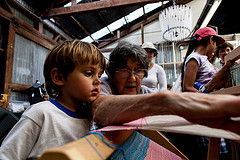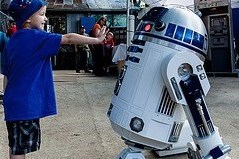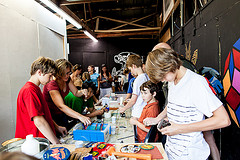Austin Mini Maker Faire 2013!
/Today’s guest post comes from one of Austin’s most beloved educators: Kami Wilt, director of the Austin Tinkering School. She is currently reprising her role as producer of the Austin Mini Maker Faire, and here she shares the latest news about my favorite event of the year. Read to the end to find out how you can enter to win a family pack of tickets!

We’re super excited to be putting on our second annual Austin Mini Maker Faire on May 5, from 10 a.m. to 6 p.m., at the Palmer Events Center.
Last year our first Austin Mini Maker Faire had over 2,000 attendees, more than twice as many as expected. It was a DIY extravaganza of hands-on projects, robots, electric vehicles, glassblowing, and so much more. This year we have over 100 Makers signed up, and we expect 5,000 attendees. (Not so mini, you might say!)
The Faire will feature:
- A Robot Petting Zoo
- Steampunk Village
- Mega Swap-o-rama of clothes-hacking and fabric arts
- FIRST robotics stage with robot battles and more
- Tinkering: Open Shop
- Eco makers of all sorts in our Sustainable Village
- Young Makers and Education area
- 2 stages, each with a full schedule of performers and speakers with a Maker element
- A 30' x 30' inflatable Planetarium
- Austin Bike Zoo, premiering their Interactive Carnival and Bike Wonderland
- 3-D printers, weaving, soldering workshops, homemade telescopes, and much much more!




In the years to come, we look forward to the cross-pollination and inspiration that will happen as our Faire grows and as schools and the community learn to utilize the event as a learning tool. Already, educators have begun to gear projects of all kinds toward the opportunities our Faire provides to “show and tell” in extraordinary ways.
Can’t wait to see you all at the Faire!
Kami Wilt
Enter our drawing to win a family pack of tickets to the Austin Mini Maker Faire! Just leave a comment below telling us which area of the Faire most interests you or another member of your family. For another chance to win, share this post on your Facebook timeline before noon on Thursday, April 18, 2013. The winner will be randomly selected and will receive 2 adult and 2 child passes, a $34 value.
We have a winner: Lolly Walter, who shared this post on Facebook, has won four Faire passes for her family. Thanks to everyone who left comments and shared with friends. You can still save on tickets by buying them in advance through the Austin Mini Maker Faire site. Hope to see you all there!












